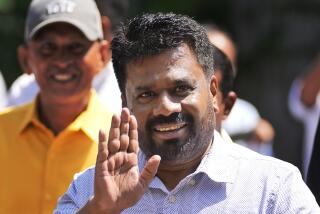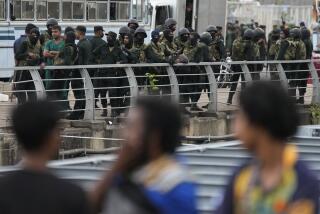Victory in Sri Lanka
- Share via
The Sri Lankan government has beheaded the Tamil Tiger separatist insurgency, claiming victory in a quarter-century war that claimed upward of 70,000 lives -- more than 7,000 since January alone. This was a brutal rebel force that deployed suicide bombers, assassinated scores of politicians -- including former Indian Prime Minister Rajiv Gandhi -- and forcibly recruited child soldiers. In their final days, the Liberation Tigers of Tamil Eelam used Tamil civilians as human shields against a crushing military offensive that the government of President Mahinda Rajapaksa executed over international appeals for a humanitarian cease-fire. The end came Monday with the deaths of rebel leader Velupillai Prabhakaran and his deputies.
The government defeated the rebels using a combination of military hardware, counterinsurgency warfare and divide-and-conquer tactics. With support from countries such as China, India and Israel, Rajapaksa neutralized Western criticism of the brutal prosecution of the war and the silencing of domestic critics until he could finish the job. But ending a war is one thing, and ensuring peace is quite another.
The Tamil minority’s struggle for independence began in response to their marginalization by the Sinhalese majority, and now the United Nations estimates that 265,000 civilians have been displaced by the fighting, their lands and homes in ruin. The U.N. and the International Committee of the Red Cross must be allowed to provide food, water and shelter for these people and to safeguard against a victor’s revenge.
Throughout the offensive, the military restricted access to the battle zone and even to the country for journalists, as well as international aid workers, impeding the gathering of information on the treatment of civilians by both sides, including alleged government shelling of hospitals. Now, the government not only must restore free speech, but must allow for an independent investigation into war crimes. In the closing days of the war, the Obama administration and the European Union had been stalling on a nearly $2-billion International Monetary Fund loan to the Sri Lankan government because of the conduct of the war. They should hold firm in tying aid to Colombo to improvements in human rights and demand that human rights violators be prosecuted.
The Sri Lankan government, meanwhile, must seek a political accommodation with autonomy for the Tamil minority. Failure to protect the Tamils and to address their needs likely will produce new rebels and more fighting in short order.
More to Read
Sign up for Essential California
The most important California stories and recommendations in your inbox every morning.
You may occasionally receive promotional content from the Los Angeles Times.













